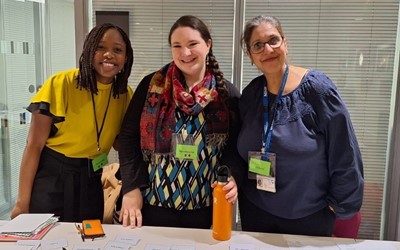
In 2023/24, the NIHR Applied Research Collaboration North Thames’ Local Authority Public Health Research Network piloted a scheme to coordinate MSc degree projects with local authority and policy partners.
The aim of the project is to offer coordinated and systematic approach to research collaborations between local authorities and universities.
We are now delighted to announce that we are accepting applications for 2024/2025 MSc projects.
Read on for more about the success of the initiative so far, and how to apply.
About the programme
The Local Authority Public Health Research Network (LAPHRN) was established by the NIHR ARC North Thames to improve collaboration between local authorities and academic institutions.
The network is open to anyone, and is an open forum for those involved to share ideas for initiatives and opportunities.
One idea raised by several members was the potential for greater collaboration on university MSc projects.
Of course, students, local authorities and universities have collaborated for many years on student dissertations. Yet often these have come about through individual connections. Many in the network felt they heard about opportunities ad hoc. Often, they weren’t sure about what was required in terms of project, or of them during the process.
We therefore decided to pilot an initiative in 2023/24 that would make the process clearer and more coordinated.
Outcomes and findings from the 2023/24 pilot
At a recent network meeting, we heard from students that had completed MSc dissertations in collaboration with London local authorities or Greater London Authority in 2023/24. They shared the following from their projects:
- A review of employment support for people with long term conditions or with disability by Tash Moriarty found some evidence – particularly from high quality evaluations of national programmes – that support can help people into work.
- A systematic approach to identifying and reviewing publicly available documents on housing policy by Rebecca Newman identified a range of strategies to improve home warmth and efficiency in inner London local authorities, most commonly through retrofits (upgrades to existing homes).
- An exploration of the impact of ‘hospital at home’ on health inequalities by Renee Gulinigaer highlighted the scarcity of literature on the topic (grey lit and scientific papers) – only 8 studies. There’s a compelling case for future research to consider inequalities, e.g. by ethnicity, environment and living situation.
- A health impact assessment of the proposed West Ham Low Traffic Neighbourhood (LTN) by Hannah Whitcombe suggested the need for the LTN to reduce harmful air pollution exposures, and provided a warning about the need to consider inequalities, particularly at the boundaries of such schemes.
A fifth student, Bahar Ghodsian, shared her summary also. Her review found a fairly consistent link between children’s food insecurity and school absenteeism. There were no studies from the UK but this evidence already suggests that children that go hungry may also be at risk of poorer educational outcomes as a result of missing school.
LAPHRN members commented the students on engaging presentations and high-quality work, noting it was “Exciting to see what’s possible”, and following up with requests for students to share what they had done, and methods used.
We also heard feedback on the pilot. As a result, we have made the following changes to improve the project this year:
- Announced the scheme earlier to provide more time for project ideas to be finalised with MSc programmes.
- Provided more guidance to supervisors on the time commitment, including advice for all to holding shorter meetings with policy collaborators with ideas to streamline selection processes with tips for students
- Offered 1-2-1 support to develop and refine up to 5 project ideas from Dr Aradhna Kaushal, an experienced supervisor and dissertation lead (UCL Online MPH)
- Aligned the scheme across UCL and LSHTM to simplify the process for local authorities seeking to offer projects to both universities
The benefits of collaborating on an MSc
Benefits for local authorities: Local authorities and policy partners have highlighted the benefits of value of students’ fresh perspectives, their application of new or advanced methods. Students may also be able to take forward a policy priority in a dissertation that staff don’t have the time to explore a promising area of inquiry.
Benefits for universities: MSc programme leads can expand the range of MSc projects on offer to students through collaborations. Students can gain skills in collaboration, experience of policy partner organisations that are particularly valuable when they are looking for jobs at the end of their course.
Benefits for MSc students: Students can gain experience of a real-world policy setting during their MSc dissertation, many are motivated by the opportunities to make an impact on policy through their work.
How it works and how to apply
How it works
- Local authorities make their application by submitting an idea for a research area
- Participating university MSc programme leads review the applications and identify the ideas that align with their MSc aims
- University MSc programme leads share the chosen projects with students
If you are a local authority that is interested in participating, you can view more guidance on the process here.
How to apply
- If you work at a local authority that has an idea for a project, complete this form by 4th November 2024
- If you’d like to book a meeting to work up a project idea together, find a time to meet with Aradhna
- If you have any queries, contact dahr.laphrn@ucl.ac.uk.

 08 Oct 2024
08 Oct 2024
